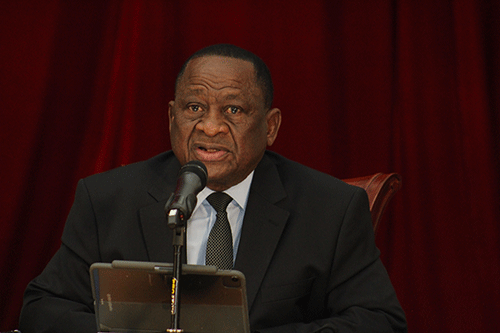Health minister Dr Kalumbi Shangula has clarified Namibia has not signed any pandemic treaty at the recently concluded World Health Assembly in Switzerland.
He said a document of that nature does not exist, adding the widely circulated petition was founded on a pack of downright falsehoods.
This comes after a group calling themselves Concerned Citizens demonstrated last month to bring to government’s attention their dismay and not to prescribe to whatever World Health Organisation treaty Namibia “may have signed”.
“The World Health Organisation has destroyed our economy and created unemployment with the lockdowns, they have hidden the truth from us and now want to control our nation’s affairs through imposing their amendments to the international health regulations at the World Health Assembly,” stated the group.
The World Health Assembly is the forum through which WHO is governed by its 194 member states.
It is the world’s highest health policy setting body and is composed of health ministers from member states.
“The whole demonstration against the signing of the non-existing treaty and the accompanying petition is founded on a pack of downright falsehoods and are dismissed in a scornful way that shows disdain,” said Shangula.
He urged Namibians to take part in the process that is ongoing and to negotiate for positions that will serve their interests as a country and protect them from possible future health emergencies.
Shangula and a delegate participated at the WHA in Geneva on 22-28 May 2022. As a WHO member state, Namibia is among nations that contribute to the policies of the organisation, appointing the director general, supervising financial policies, and reviewing and approving the proposed programme budget.
“The 75th World Health Assembly, discussed proposals to amend certain Articles of the International Health Regulations (2005). The assembly adopted proposed amendments to Article 59 on Entry into Force. It should be noted that the amendments do not amount to a treaty,” Shangula added.
On 1 December 2021, the WHA decided to establish an Intergovernmental Negotiating Body (INB) to strengthen pandemic prevention, preparedness and
response.
The decision follows extensive discussions amongst the WHO member states on their experiences responding to the pandemic and the challenges that the member states faced including diagnostics, PPEs, equipment, therapeutics, and vaccines.
“The Covid-19 pandemic exposed the flaws in the global health architecture to protect people from pandemics. The most vulnerable people had to go without basics such as personal protective equipment (PPE) including facemasks, ventilators, medical oxygen and other tools,” recalled Shangula.
No such thing… Health minister Dr Kalumbi Shangula.
Photo: Paheja Siririka


